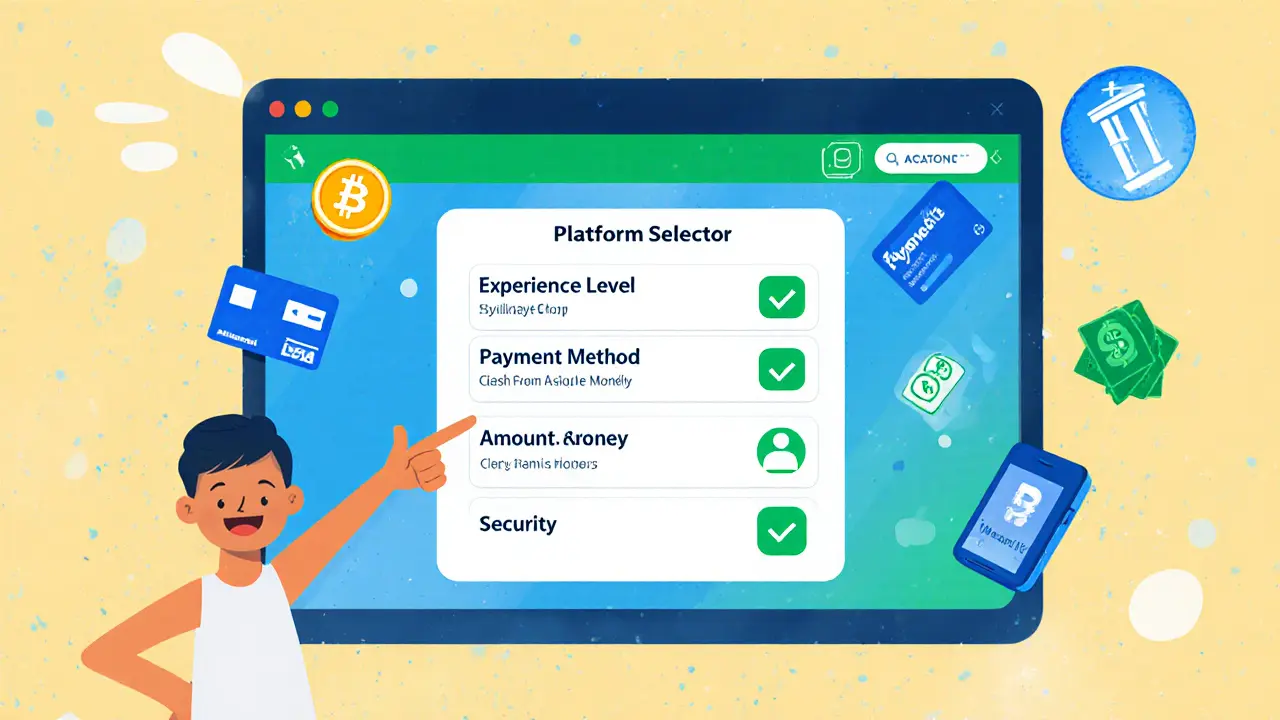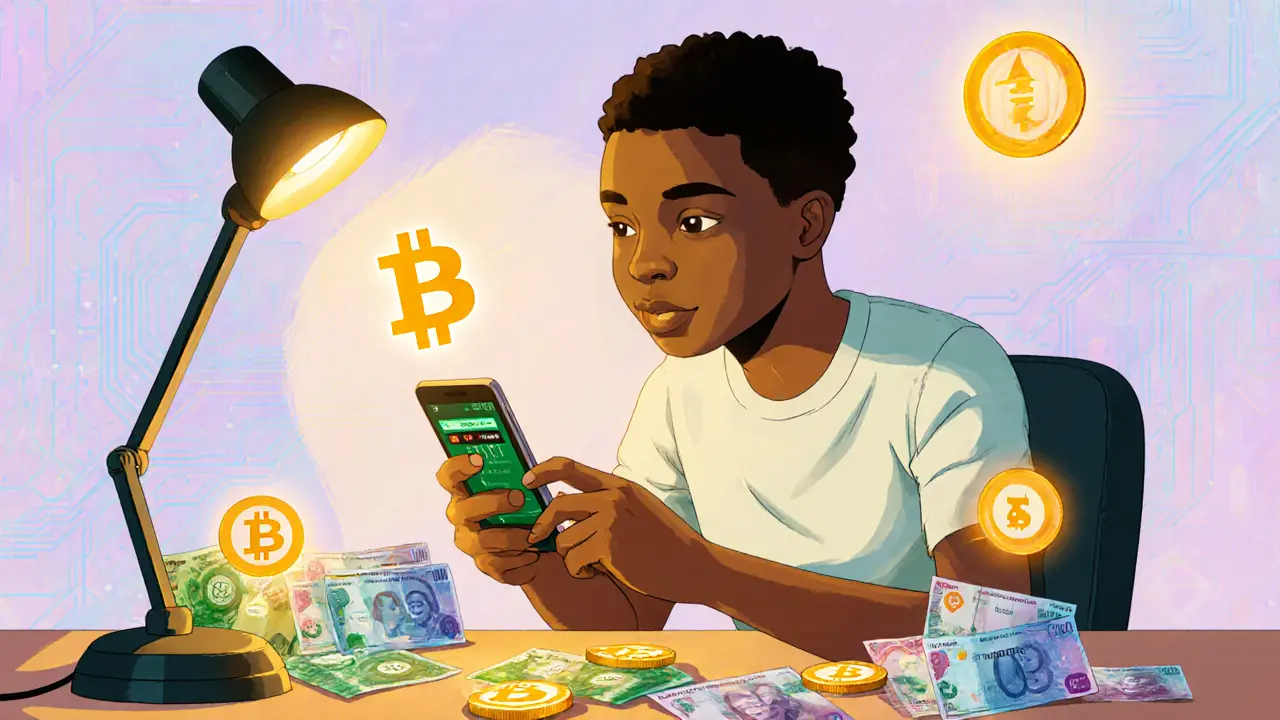Crypto Buying Platform Selector
Want to turn your Nigerian Naira into Bitcoin, Ethereum, or any other digital coin but aren’t sure where to start? The market has grown despite the Central Bank’s 2021 clamp‑down, and there are now several reliable ways to buy crypto Nigeria residents use every day. This guide walks you through every decision point - from picking a wallet to completing a transaction - so you can move money confidently and safely.
Understanding the Current Landscape
Since the Central Bank of Nigeria (CBN) implemented a ban on direct banking support for cryptocurrency trading in 2021, many platforms have built workarounds that keep the market alive. Ownership of crypto remains legal for individuals, but banks cannot directly process crypto‑related payments. As a result, users now rely on crypto brokers, full‑featured exchanges, and peer‑to‑peer (P2P) marketplaces that either integrate alternative payment rails or use escrow systems to protect both parties.
Pick a Wallet Before You Buy
A wallet is your digital safe deposit box. It stores private keys, not the coins themselves, and you’ll need one before you can receive any crypto. Two main options exist:
- Mobile wallets (e.g., Trust Wallet, MetaMask) - quick to set up, ideal for small amounts and frequent trading.
- Hardware wallets (e.g., Ledger Nano S) - add an extra layer of security for larger holdings.
Choose a wallet that supports the coins you plan to buy and offers a simple backup process. Write down the seed phrase on paper and store it offline.
Platform Options for Nigerian Users
Depending on how hands‑on you want to be, you can pick from three categories:
Crypto Brokers - Best for Beginners
Broker platforms let you buy crypto at a fixed price using NGN, without dealing with order books. Luno is a popular broker that supports direct Naira deposits via bank transfer and debit cards. The onboarding flow is straightforward: sign up, verify identity, deposit NGN, and click “Buy”.
Full‑Featured Exchanges - For Active Traders
If you want charting tools, limit orders, and a wide range of assets, look at exchanges that still serve Nigerians. Blockchain.com added native NGN support in March2025, allowing instant purchases of Bitcoin, Ethereum, Dogecoin, and more is a prime example. After completing KYC, you can fund your account with NGN and start trading immediately.
Peer‑to‑Peer (P2P) Marketplaces - Privacy & Flexibility
P2P platforms match you with individual sellers who accept a variety of payment methods. Two of the biggest names are LocalBitcoins a long‑standing P2P marketplace that offers escrow protection for every trade and Binance which runs a dedicated P2P hub for Nigerian users supporting NGN, USD, and multiple payment options. You create an advertisement, choose a price, and receive NGN via bank transfer, mobile money, or even cash‑in‑person.
Payment Methods & KYC Requirements
All reputable platforms ask for some form of identity verification - commonly called KYC verification (Know Your Customer) to satisfy anti‑money‑laundering regulations. The exact documents vary, but you’ll typically need a government‑issued ID, a recent utility bill, and a selfie holding the ID.
Supported payment rails include:
- Bank transfers (via Interbank Transfer, GTBank, Access Bank, etc.)
- Debit/Credit cards (Visa, Mastercard)
- Mobile payment apps (Paga, OPay)
- International services (Apple Pay, Google Pay) - available on platforms like Changelly which aggregates offers from verified providers and supports cards, Apple Pay, Google Pay, and PayPal
For transactions over $150 (≈₦70,000), most platforms require full KYC before the first trade.

Step‑by‑Step: Buying Crypto with NGN
- Set up a wallet. Install a mobile wallet, back up the seed phrase, and note the receiving address.
- Choose a platform. Beginners often start with Luno or Blockchain.com; traders may prefer Binance P2P or Changelly; privacy‑focused users gravitate to LocalBitcoins.
- Create an account. Provide email, phone number, and a strong password. Expect an email verification step.
- Complete KYC. Upload a clear photo of your national ID, a recent utility bill showing your name and address, and a selfie. Verification usually finishes within minutes for broker platforms and up to 24hours for exchanges.
- Deposit NGN. Select your preferred payment method. For bank transfers, copy the platform’s account details, initiate the transfer from your banking app, and wait for confirmation (often instant on broker platforms).
- Buy the crypto. Enter the amount of NGN you want to spend, review the exchange rate and fees, and confirm. The crypto appears in your platform wallet instantly.
- Transfer to your personal wallet. Paste your wallet address, double‑check the network (e.g., ERC‑20 for Ethereum), and hit “Send”. You’ll usually see the transaction within a few minutes.
That’s it - you’ve turned Naira into a digital asset.
Platform Comparison Table
| Platform | Type | NGN Support | Payment Methods | Typical Fees | Notable Feature |
|---|---|---|---|---|---|
| Luno | Broker | Yes (direct) | Bank transfer, debit card | 0.5%+₦100 flat | Beginner‑friendly UI, instant NGN deposits |
| Blockchain.com | Exchange | Yes (native) | Bank transfer, Visa, Mastercard | 0.3%+₦50 | Native NGN on‑ramp, low latency trades |
| Changelly | Aggregator | Through providers | Card, Apple Pay, Google Pay, PayPal | 0.5%‑1% (varies) | Multiple offers in one view, fast processing |
| LocalBitcoins | P2P | Yes (seller dependent) | Bank transfer, cash, mobile money | Escrow fee ~0.5% (buyer) | High privacy, negotiable rates |
| Binance P2P | P2P | Yes (official hub) | Bank transfer, USSD, cash | Zero fees for buyer | Large liquidity, $20 signup bonus |
| Breet | OTC | No (sell‑only) | Bank account (NGN payouts) | 0%+₦100 per sell | Instant NGN payouts, no trading charts |
| Bybit P2P | P2P | Yes (USDT/USDC pairs) | Bank transfer, cash | Zero buyer fee | USDT default pair, $20 bonus for new users |
Tips, Tricks, and Common Pitfalls
Even with a smooth process, newcomers stumble on a few recurring issues. Here’s how to dodge them:
- Verify platform compliance often. Regulations shift, and a platform that accepted NGN yesterday might block it tomorrow. Keep an eye on official announcements or community forums.
- Watch the exchange rate. P2P offers can be 1-3% better than broker rates, but they also carry counter‑party risk. Use escrow‑protected platforms and double‑check the listed price.
- Factor in hidden fees. Some banks charge ₦200-₦500 for outbound transfers to crypto platforms. Include those costs when comparing total spend.
- Maintain multiple accounts. If one service goes offline due to a regulatory clamp, you’ll still have another route to move money.
- Secure your wallet. Enable two‑factor authentication on the platform, store seed phrases offline, and consider a hardware wallet for amounts over ₦500,000.
Next Steps for Different Personas
New to crypto? Start with Luno, complete a ₦10,000 purchase, and transfer the coins to a mobile wallet. This gives you hands‑on experience with no steep learning curve.
Active trader? Open accounts on both Blockchain.com and Binance P2P. Use the exchange for spot trading and the P2P hub for cheaper NGN top‑ups.
Privacy‑focused user? Stick to LocalBitcoins or Bybit P2P, negotiate payment methods you trust, and keep your assets in a hardware wallet.
Frequently Asked Questions
Can I buy Bitcoin directly with Naira in 2025?
Yes. Platforms like Luno, Blockchain.com, and Binance P2P let you deposit NGN and receive Bitcoin instantly after KYC verification.
What documents do I need for KYC?
A valid Nigerian ID (e.g., International Passport or Driver’s License), a recent utility bill or bank statement showing your name and address, and a selfie holding the ID.
Are crypto purchases taxable in Nigeria?
The Federal Inland Revenue Service treats crypto gains as taxable income if you realize profit through sale or conversion. Keep transaction records to calculate any applicable tax.
Which payment method is cheapest for NGN deposits?
Bank transfers via major Nigerian banks usually have the lowest fees (often free). Card payments incur a 1‑2% surcharge, while mobile money can add a small flat fee.
What if a P2P trade goes wrong?
Use platforms that offer escrow protection (LocalBitcoins, Binance P2P). The escrow holds the crypto until the seller confirms receipt of NGN. If the seller disappears, you can open a dispute and get a refund.


Anurag Sinha
Yo, they dont want you to see this but the whole crypto on‑ramp in Nigeria is actually a front for a massive data collection scheme. Every time you type your NIN into Luno or Binance they are logging it, cross‑referencing with your bank account and feeding it to unknown third parties. Think about it, the CBN ban was a smokescreen to push us into P2P where they cant control the flow. The truth is hidden in the fine print, but most people just click "agree" and hand over their soul. If you want real freedom, stay off the usual platforms and use privacy‑first tools like Wasabi Wallet and self‑hosted nodes.
Remember, the biggest risk is not the market volatility, it's the data you give away.